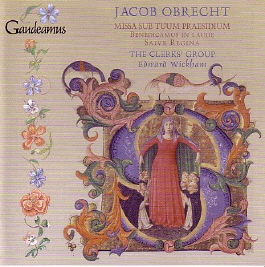

 |
 |
|
|
Edward Wickham director Ruth Massey, Kim Porter, Lucy Ballard Christopher Watson, Tom. Raskin, Jonathan Arnold, Edward Wickham
In Memoria: Songs of Death and Remembrance Gregorian chant; Guillaume Dufay Jean Ockeghem Jacob Obrecht Josquin Des Prez Scenes from the Roman de Fauvel with poetry by Ian Duhig The Clerks' Group's annual concert for their supporters, who sustain the group's recording programme of rare repertoire, is always a special event. They tend to explore different ecclesiastical venues and none has been better than this bombed, destroyed and rebuilt City church (it should be considered by concert promoters, having excellent acoustics, a raised platform and good sight-lines, c.p. e.g St Bride's). This was a quite unusual concert of early music. The first half consisted of a ravishing sequence of motets composed in memory of fellow composers and, rather bizarrely, some for the composers' own funerals. Obrecht, in dubious taste, celebrates his father William for having produced "the Orpheus Jacob for the Muses"! This sequence will be the basis for The Clerks' Group's next CD. The Roman de Fauvel* is a huge medieval book of satirical stories with music; a facsimile copy was open for inspection, and some pages were projected to accompany the performance of a selection (unfortunately the screen was not placed in the corner, so some of us could not view the pictures behind the singers; that should be easily rectified, when the complete work is given in September as part of the SBC Early Music Weekend.) There were no programme notes, so I give below a brief explanation about this scurrilous entertainment about a horse who ascends to the throne, replete with lavatorial humour. It brought to mind, as a modern equivalent, Jarry's Ubu Roi. A general point to consider about the presentation of 14 C motets; multiple texts are often sung simultaneously (Superius, Tenor & Contras or Quadruplum, Triplus & Motetus etc) and listening energy is dissipated in trying to follow them, the more so when they are not printed parallel. The Roman de Fauvel seems designed to break new ground for The Clerks' Group and surely a recording will follow? They would do well to explore new technology for presentations, q.v. DG's Pollini Beethoven CD-extra, with score to follow as you listen, and I Fagiolini's pioneering Orazio Vecchi DVD the making of which I initiated. Roman de Fauvel is provided with a modern text, a DVD waiting to be made? The Clerks' Group's latest CD, desirable as they all are, is devoted to Requiems by de la Rue & Brumel, the grim cover picture of collection of bodies of plague victims. Their CD of Obrecht [Gaudeamus CD GAU 341] displays the extraordinarily intricate invention of this celebrated composer (1457-1505) who was "not averse to showing off his compositional brilliance". His Missa Sub tuum praesidium is one of the most intriguint and ingenious mass settings of the early Renaissance, with a cantus firmus in the top voice that is repeated in the same note values throughout, "as if casting a mighty cloak over the busy polyphony below. The scoring increases from three to seven voices; it wears its cleverness but also its beauty, on its sleeve. With several additional motets, the disc concludes with Factor Orbis, "a joyful collage of Advent chants and texts" with a slowing down to half speed at 7'10" giving you a chance to explore the repeat in slow motion! wears its cleverness but also its beauty, on its sleeve. With several additional motets, the disc concludes with Factor Orbis, "a joyful collage of Advent chants and texts" with a slowing down to half speed at 7'10" giving you a chance to explore the repeat in slow motion!
Impeccable singing, recording and learned commentaries by Edward Wickham, it goes without saying in this series.
* Roman de Fauvel During the fourteenth century, the church was receiving widespread accusations of corruption. The Roman de Fauvel was the venue for the voice of musicians and poets about this corruption. The Roman de Fauvel is a satirical poem written by Gervais du Bus in 1310. The main character of du Bus' poem is a horse named Fauvel. Fauvel was given his name by taking the first letters of the seven sins accused of the church: Flaterie, Averice, Vilanie, Variete (fickleness), Envie, and Laschete (cowardice). Music, however, was not added to the Fauvel until 1316, by Chaillou de Pesstain. Pesstain introduced 167 pieces of music to the Fauvel. Among these 167 compositions, some date back to the twelvth century, placed where appropriate within the context of the poem, while others were newly composed at the time of Pesstain's work. Many of these newly composed pieces are Ars Nova (New Art), and accredited to Phillipe de Vitry, who also happened to be the founder of ars nova.
|